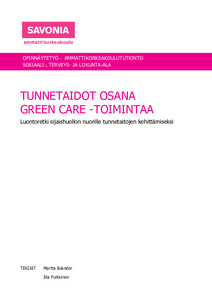Tunnetaidot osana Green Care -toimintaa : Luontoretki sijaishuollon nuorille tunnetaitojen kehittämiseksi
Pulkkinen, Iita; Islander, Martta (2024)
Pulkkinen, Iita
Islander, Martta
2024
All rights reserved. This publication is copyrighted. You may download, display and print it for Your own personal use. Commercial use is prohibited.
Julkaisun pysyvä osoite on
https://urn.fi/URN:NBN:fi:amk-202404298214
https://urn.fi/URN:NBN:fi:amk-202404298214
Tiivistelmä
Opinnäytetyön tarkoituksena oli järjestää toiminnallinen viikonloppu toimeksiantaja sijaishuoltoyksikkö Ihalan Tuvan nuorille. Retken aikana käsiteltiin tunnetaitoja erilaisin menetelmin luontoympäristössä. Opinnäytetyön tavoitteena oli saada kyseiset nuoret havainnoimaan omaa tunteidenkäsittelytaitoa luonnon avulla. Sen myötä nuorilla oli mahdollisuus löytää luonnosta uusia voimavaroja osaksi omaa arkeaan ja hyvinvointiaan.
Opinnäytetyö toteutettiin toiminnallisena opinnäytetyönä. Opinnäytetyö eteni lineaarisen mallin mukaisesti ideointi- ja suunnitteluvaiheesta toteutukseen ja siitä toiminnan arviointiin ja kehittämiseen. Luontoa hyödynnettiin tunnetyöskentelyssä, koska luontoympäristöllä on tutkitusti vaikutusta psyykkiseen toimintakykyyn. Tunnetaidoilla tarkoitetaan kykyä tunnistaa ja säädellä omia tunnetilojaan. Luontoympäristö rauhoittaa mieltä ja vahvistaa positiivisia tunteita. Luonnossa on vähemmän aistiärsykkeitä, jonka vuoksi se on sopiva ympäristö tunnetaitojen harjoittelulle. Viikonlopun aikana nuorten kanssa käsiteltiin tunnetaitoja keskustellen.
Opinnäytetyönä toteutettu retkiviikonloppu oli onnistunut kokemus. Nuorilta saatu palaute oli positiivista ja he nauttivat järjestetystä toiminnasta. Nuoret osallistuivat tunnetyöskentelyn keskusteluihin aktiivisesti ja toimivat viikonlopun ajan omatoimisesti luontoympäristössä. Nuoret hyötyivät luonnossa tapahtuneesta tunnetyöskentelystä, sillä he kokivat ympäristön olevan rauhoittava paikka, jossa keskusteluille oli annettu tilaa ja aikaa. Nuoret hyötyisivät säännöllisestä tunnetyöskentelystä, joten toimintaa voisi kehittää säännölliseksi osaksi yksikön arkea. The purpose of the thesis was to organize a functional weekend for the client organization, foster home Ihalan Tupa. During the weekend trip, emotional skills were processed using various methods in a natural environment. The aim of the thesis was to get the clients to observe their own emotional processing skills through nature. Clients had the opportunity to discover new resources from nature to incorporate these into their daily lives and well-being.
The thesis was conducted as a functional thesis. It progressed through a linear model from the planning phase to implementation, followed by assessment and development of the activities. Nature was utilized in emotional work because the natural environment has been proven to impact psychological functioning. Emotional skills mean the ability to recognize and regulate one's own emotions. The natural environment calms the mind and strengthens positive emotions. As there is less sensory stimulation in nature, it is a suitable environment for practicing emotional skills. Throughout the weekend, emotional skills were discussed with the clients.
The excursion weekend conducted as part of the thesis was a successful experience. Feedback from the young participants was positive and they enjoyed the organized activities. The clients actively participated in discussions about emotional work, and independently engaged with the natural environment throughout the weekend. The clients benefited from the emotional work in nature, as they perceived the environment as a calming place where discussions were given space and time. Regular emotional work would benefit the clients, so the activities could be developed into a regular part of the foster home’s routine.
Opinnäytetyö toteutettiin toiminnallisena opinnäytetyönä. Opinnäytetyö eteni lineaarisen mallin mukaisesti ideointi- ja suunnitteluvaiheesta toteutukseen ja siitä toiminnan arviointiin ja kehittämiseen. Luontoa hyödynnettiin tunnetyöskentelyssä, koska luontoympäristöllä on tutkitusti vaikutusta psyykkiseen toimintakykyyn. Tunnetaidoilla tarkoitetaan kykyä tunnistaa ja säädellä omia tunnetilojaan. Luontoympäristö rauhoittaa mieltä ja vahvistaa positiivisia tunteita. Luonnossa on vähemmän aistiärsykkeitä, jonka vuoksi se on sopiva ympäristö tunnetaitojen harjoittelulle. Viikonlopun aikana nuorten kanssa käsiteltiin tunnetaitoja keskustellen.
Opinnäytetyönä toteutettu retkiviikonloppu oli onnistunut kokemus. Nuorilta saatu palaute oli positiivista ja he nauttivat järjestetystä toiminnasta. Nuoret osallistuivat tunnetyöskentelyn keskusteluihin aktiivisesti ja toimivat viikonlopun ajan omatoimisesti luontoympäristössä. Nuoret hyötyivät luonnossa tapahtuneesta tunnetyöskentelystä, sillä he kokivat ympäristön olevan rauhoittava paikka, jossa keskusteluille oli annettu tilaa ja aikaa. Nuoret hyötyisivät säännöllisestä tunnetyöskentelystä, joten toimintaa voisi kehittää säännölliseksi osaksi yksikön arkea.
The thesis was conducted as a functional thesis. It progressed through a linear model from the planning phase to implementation, followed by assessment and development of the activities. Nature was utilized in emotional work because the natural environment has been proven to impact psychological functioning. Emotional skills mean the ability to recognize and regulate one's own emotions. The natural environment calms the mind and strengthens positive emotions. As there is less sensory stimulation in nature, it is a suitable environment for practicing emotional skills. Throughout the weekend, emotional skills were discussed with the clients.
The excursion weekend conducted as part of the thesis was a successful experience. Feedback from the young participants was positive and they enjoyed the organized activities. The clients actively participated in discussions about emotional work, and independently engaged with the natural environment throughout the weekend. The clients benefited from the emotional work in nature, as they perceived the environment as a calming place where discussions were given space and time. Regular emotional work would benefit the clients, so the activities could be developed into a regular part of the foster home’s routine.
